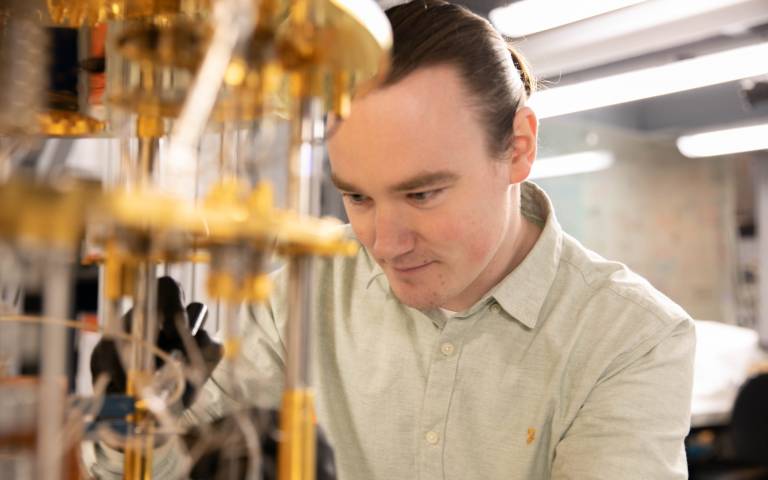UCLQ and partners form UK contribution to EU silicon spin qubit project
4 February 2021
EU Quantum Flagship selects silicon spin qubits as a platform for large-scale quantum computing

UCLQ researchers and spin-out Quantum Motion form part of a European consortium that was launched today with the goal of scaling silicon quantum technologies. UCL joins the project as the only UK based university partner.
Named QLSI (Quantum Large-Scale Integration with Silicon), this four-year EU project, coordinated by CEA, will lay the foundation for the EU’s industrial-scale implementation of semiconductor quantum processors and position Europe as a global leader in quantum computing. The project will focus on demonstrating that spin qubits are the leading platform for scaling to very large numbers of qubits, the building blocks of quantum information processing.
The QLSI consortium features a dynamic team with a complementary skillset, bringing together experienced academics with deep knowledge of in silicon nanostructures and spin qubits, RTOs with silicon CMOS technology expertise, major international businesses in the semiconductor and computing industries, as well as Europe’s thriving quantum start-up sector. Each member brings state-of-the-art expertise in their area required to address the challenges of building a scalable quantum computer.
The partners have already realized many of the key advances in the field of silicon quantum, like UCLQ who’s recent research opens potential route to couple qubits across separate silicon nanowires.
The QLSI consortium will take this principle to the next level with the demonstration of a 16-qubit chip, and will also make an 8-qubit chip available for external use through the Quantum Inspire open-access quantum cloud environment. What makes silicon so attractive? Owing to their experience, the partners have already quantified promising single qubit performance: small size, high fidelity, fast read-out and manipulation. Working with silicon, the next step is to leverage the vast infrastructure of the global semiconductor industry.
“Europe is well-positioned to take the EU’s spin-qubit R&D to the next level, in what is a high-stakes competition among advanced technological countries,” said Maud Vinet, CEA-Leti’s quantum hardware program manager, who will lead the four-year, €15 million ($17.7 million) project. “The QLSI project ramps up a dedicated effort across all leading European groups in the field of spin qubits to develop complete processor systems that eventually will reach the thousands of qubits expected as a first step to show the potential for universal, error-corrected quantum computing.”
QLSI will pursue four essential results:
- Fabrication and operation of 16-qubit quantum processors based on industry-compatible semiconductor technology
- Demonstration of high-fidelity (>99 percent) single- and two-qubit gates, read-out and initialization with these devices in a lab environment
- Demonstration of a quantum computer prototype, with online open-access for the community, integrating such a high-quality quantum processor in a semi-industrial environment (up to eight qubits available online), and
- Documentation of the requirements to address important issue of scalability towards large systems >1,000 qubits.
The project is a recent addition to the EU’s ambitious Quantum Flagship program, a 10-year, €1 billion ($1.18 billion) R&D initiative launched in 2018. It is a coherent set of research and innovation projects selected through a thorough peer-review process. The overall goal is to consolidate and expand European scientific leadership and excellence in quantum computing, to kick-start a competitive European industry in quantum technologies and to make Europe a dynamic and attractive region for innovative research, business and investments in this field.
Links:
- Read more about UCLQ’s recent research related to this project
- Read more about this project at CEA-Leti
- Visit UCLQ’s Quantum Spin Dynamics research group
- Find out more about UCLQ spin-out Quantum Motion
Image:
UCLQ dilution refrigerator (Credit: O’Neill, UCLQ)
 Close
Close

